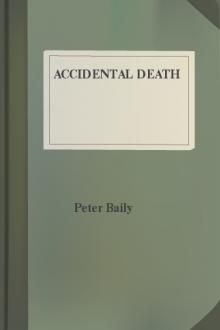Sanity by Judy Colella (interesting novels in english .TXT) 📖

- Author: Judy Colella
Book online «Sanity by Judy Colella (interesting novels in english .TXT) 📖». Author Judy Colella
“That all depends on what you tell me. But before you tell me anything else, please tell me your name.”
“I don’t remember it.”
She stared for a moment, confusion, suspicion, disbelief and concern all vying for attention with her facial muscles. “I…I don’t understand. Why don’t you remember your name? Did you have a head injury?”
He wanted to laugh. Head injury…that had been the least of his wounds. “I don’t have amnesia, if that’s what you mean. I can’t remember my name because I haven’t used it in many, many years.” As soon as he said this, he remembered that he didn’t look like he’d had that much time during which to forget. He shrugged, watching her react to the apparent discrepancy with what she believed was real.
“I see,” she said at last. “Well, what kind of, of identifier have you been using?”
“A number. I’m P-710.”
“And what does that mean?”
“Patient Number Seven Hundred and Ten.”
She nodded, only a little less confused. “Where were you a patient?”
“The Weatheridge Asylum.” There was no lie he could think of that would get him out of this. He didn’t know enough about the current world to formulate one.
She didn’t say anything for a while after that, but began making tapping noises on the other side of the device. It sounded to him like someone typing, but without the clatter of a typewriter.
“Do you think you might have a family somewhere?” she asked a long several minutes later.
“I don’t know.” How could he? His only link back then with family had been his father, and after the man’s unexpected death, no one had come to the asylum to claim him. To rescue him. “I remember my father’s name, if that helps.”
“It might.” She was frowning again. The false smile, it seemed, had been banished for now.
“Dr. Frederick Colson. He was a clinical psychologist who worked with Dr. Weatheridge when the asylum was founded.”
“I see.” What Dr. Franco saw, he guessed, was how the math didn’t work with the evidence of her eyes. “Give me a moment, please.” She began the tapping once more, her frown deepening, leaning closer to whatever was on the other side of that lid. Some time later she sat back and took a deep breath. “There was a Dr. Frederick Colson employed at Weather- idge back then. He was married, but his wife died two years after the place opened. They had a son named Maxwell.” She watched him, her gaze narrowed in anticipation of his reaction.
He looked away, hoping she couldn’t detect the sudden emotion that almost overwhelmed him. Max Colson. That’s who he once was. Only Maxwell when his father was annoyed with him, but normally and to everyone else, to himself, just Max. My God, he thought, how had I forgotten that?
“Max?”
The immediate return of his gaze to hers in reaction was completely involuntary, answering her suspicions, he was sure. But what questions would follow? And how deep would be her disbelief that he could be that same boy?
“What happened to your mother?”
Not what he’d expected her to ask. ”She died.”
“How?”
“I don’t know. She kept getting more and more frail, and had a hard time breathing most days. She coughed a lot, too.”
“Was there blood?”
He shrugged. “I got sent out of the room every time she’d start, so I can’t say. But one night she went to sleep and never woke up.” He remem- bered that well enough, wished he didn’t, and almost shut down.
His distress must have been obvious. “Max, are you all right?”
Indignation was rearing its head. Mr. Colson to you, madam, he almost said…P-710 almost said. Laughable, that. “No, I am not. You’re making me recall things I had happily forgotten.”
“Like your name?”
“No.” He sighed. “I’m glad you reminded me of that, I suppose.”
Dr. Franco nodded and looked back at the object in front of her. “Did you ever hear of lung cancer?”
“Not specifically. But I know what lungs are, of course, and the cancer is a common and deadly disease.”
“Oh.” She was frowning again, but he had no idea why. “How did your father die?”“I was told he was in some kind of accident. One of the new electric cars…they said the driver lost control and it struck him as he was walking in front of some shops. I believe he’d gone out to purchase a few things for the hospital – carbolic acid, pine tar, things like that for cleaning.”
“That – that’s very sad. I’m sorry, Max.”
“You don’t have to keep using my name. It won’t make me relate to you any better.”
She looked taken aback. “So you know something about psychology!”
“Quite a bit. My father used to read to me out of his texts, especially one by James…um, William James, I believe.”
“What was the title?”
“If I’m not mistaken, it was Principle of Psychology. Father said it had been published about twelve years earlier. He’d read it before, but hadn’t owned a copy until he began working at the asylum and could afford to purchase one.”
“So you wanted to follow in his footsteps and become a psychologist, too?”
“I might have. I don’t remember.”
She glanced at her device once more, then closed the lid. “May I be completely honest with you?”
No, lie. Please. “I would hope you’d be honest, yes.”
“You have a knack for expressing yourself like someone from another era, and know things about Dr. Colson and his family that – well, you could have read about them, then imagined what their lives were really like so that your story sounded genuine. But Max, if in fact that’s your name, what you suggest simply is not possible. Dr. Colson lived over one hundred years ago, and you’re what - ”
“One hundred and twenty two.”
She compressed her lips into a line of pity.
“I was used for an experiment, Dr. Franco. I stopped aging when I turned twenty-one.”“Oh, Max. Look, until I know for sure, I’m going to have to recommend you be sent to one of our institutional residences for people with – “
“No. Kill me instead. I will not live like that again!” He had risen to his feet, his eyes darkening with something that was closer to fear than anger.
“How can I believe your story?”
“Research, doctor. Do some research. Find the list of doctors who worked at Weatheridge over the years and see if there’s a sourcebook that describes their efforts there. None of it will tell the whole truth, of course, but perhaps enough will come to light to give credence to my claims. Two of the early ones were geneticists, uh, Dr. Claude Ferenc, and I don’t recall the name of the other. Later on, a lot of doctors from Germany and France took up residence there as well. Find out who they were. Then read why the asylum was closed down. About the way they treated the patients. And try to find the logs of the people committed for long-term care. You’ll see my name there, and that I was diagnosed – falsely – with the condition they had recently begun to call schizophrenia. What it won’t tell you, however, is that at the time I was committed, I was eleven years old. I had discovered some of what was going on after Dr. Weatheridge died, had caught some of the doctors in the act of torturing patients. Soon after, my father died – and to this day, I’m convinced it was not an accident. Instead of sending me away, they committed me, locked me up in a cell and gave me a number. After that, I never heard my name spoken – until today. You’ll also see that P-710 was still there undergoing treatment until they were shut down. Please. I cannot go through anything like that again.” He had begun to shake and had to sit.
Dr. Franco didn’t seem to know what to say to all that, but it was clear her thoughts were spinning almost faster than she could address each of them. But then her eyes softened. “My God, Max, that isn’t how things are done. The place I’m talking about is beautiful, comfortable, staffed with people who genuinely care and want nothing more than to see their patients get well.”
“Is it, is it really? Because that’s exactly the way they once described Weatheridge Asylum. All those compassionate, caring doctors who would look a patient in the eye and smile, assuring him with gentle words and soft tones that he was safe with them. Then as soon as he relaxed, would inject him and take him off to one of the operating rooms where the only evidence of his miserable existence was the sound of his screams. His and the others’ being eviscerated or worse. The women were used for experiments designed to find viable ways to end unwanted pregnancies, and for…other purposes. And all at the hands of doctors who said they cared about their patients.” He lowered his head into his hands, feeling nauseated.
She got up without responding and went out, taking the device with her. As soon as the door clicked shut, Maxwell Colson got up and went to stand by the door, his ear pressed to the crack between it and its frame. As he suspected, she hadn’t gone far, and he could just make out her words as she spoke with one of the officers.
“…understand why he doesn’t trust anyone if what he says is true. Of course, it couldn’t have been the same place – he’s too young.”
“Well, he can’t exactly stay here, and no way is he going back to the asylum!” This voice could have belonged to one of the men who’d brought him here, but he couldn’t be sure.
“I know. God, if only I could show him how different thing are now! How – ha! Listen to me! I’m talking like I believe he was actually there over a hundred years ago!”
“I was,” whispered Max, sinking to the floor, despondent, hopeless.
She was talking again, but he hadn’t paid attention for a few seconds. “…research like he suggested,” she was saying. “Maybe I will discover something that can help him, or be useful somehow.”
“Fine. In the meantime, though, what do you recommend we do with him?”
“He doesn’t seem prone to violence, from what I could tell. Perhaps an assisted living facility, or a foster home of some kind?”
As the man started to reply, they moved further from the door, and Max could no longer hear them. He leaned his head back against the wall, and for the first time in many, many, many years, felt tears sliding from under his closed lids. Guess I’m still human enough to do this, he told himself. Too bad it doesn’t matter any more.
III
In the end, they’d been forced to sedate him. That hadn’t been easy – he’d fought their attempts with a strength that surprised even himself. But Dr. Franco had managed to insert herself between the officers trying to hold him still and jab him with a syringe containing something much stronger than anything he’d experienced before. The reaction was instantaneous; he’d been seconds away from breaking free, and then he was waking up in a soft bed





Comments (0)